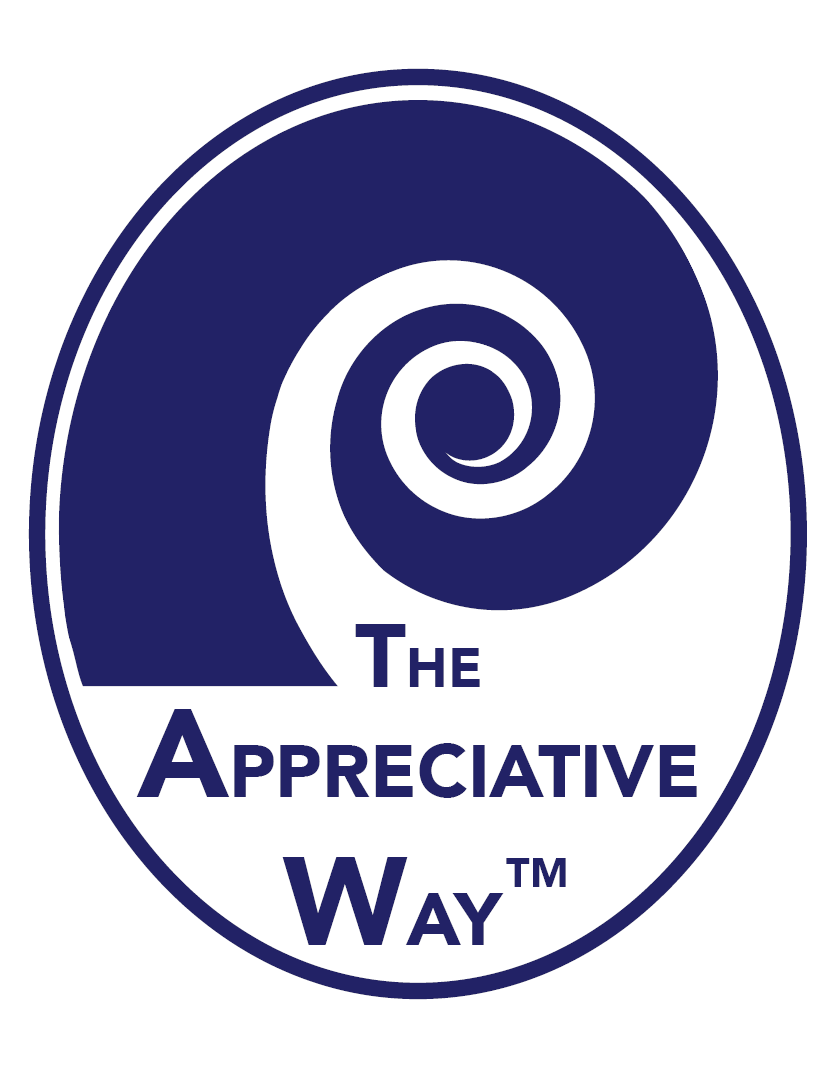

Rob Voyle's Appreciative Way Blog
Additional Articles By Year: 2016 | 2015 | 2014 | 2013 | 2012 | 2011 | 2010
Coaching: Paul's Conundrum Explained
Posted: August 28, 2014 by Rob Voyle
In his letter to the Romans Paul vividly describes his dilemma that the harder he tries not do the thing he doesn't want to do the more he actually does it. (Romans 7:18-20)
Passing laws against doing bad things doesn't stop people doing them, and it certainly doesn't ensure people do good things. As Paul vividly point's out the law is powerless to stop us doing bad things and it is powerless to get us to do good.
Why is that?
Last week I mentioned that goals need to be imaginable. Things that are not imaginable are intellectual abstractions and abstractions will not change people's behavior.
You have probably used the illustration "don't think of a purple cow," in fact you could take a moment and try really hard not to think of a purple cow...
The result is that you are holding in conscious the very thing you don't want. This little exercise demonstrates a profound point:
"It is impossible to image in consciousness a negation."
Trying to imagine a negation will result in a person "seeing" the very thing they don't want or they be conscious of an abstraction, or a very blurred pictures that is not compelling.
This is why negatively stated goals are rarely achieved. It is impossible to create in consciousness a picture of what you don't want. Negative goals are unimaginable and are therefore unachievable.
While that seems simple to understand we live in a society and participate in churches that are awash in negative goals. We put incredible effort into them and barely achieve a sustainable outcome.
Here are some classic negative goals.
Eliminating poverty
Child abuse prevention
Crime prevention
Conflict management
Deficit reduction
You shall not commit adultery
Anti-racism
Non-violent communication
Non-anxious presence
War on terror
Fighting for peace
No child left behind
We can also list any goal that uses the word "less" as in "I want to be less depressed."
Notice how each statements causes us to hold in consciousness what we don't want, but does not evoke in consciousness what we want in its place.
All of these statements will either inspire continued action in what we don't want because that is what we see in our minds or will be perceived as an abstraction and not motivate any behavior.
The first step when dealing with something we don't want is to define the problem from the perspective of what we want more of in place of the problem.
The shooting of Michael Brown in Ferguson has lead some to call for more anti-racism training. Here I am not only sad for Michael, his family, and the people of Ferguson, but also a total pessimist. Anti-racism training will not help and it may actually hurt because it will hold in consciousness racism the very thing we don't want. The problem isn't racism, the problem is the lack of respecting the dignity of all and cross-cultural collaboration for the benefit of all humanity.
Take a moment and create a picture of anti-racism training in your mind...
Now take a moment and create a picture of training that helps you respect the dignity of all and collaborate with people of other races and cultures...
Which creates the more compelling and motivated response for good.
Notice Dr. King didn't say. "I have a dream of a place where there is no racism..." instead he created a picture of a place where children of different races could eat together.
Likewise, we don't need another cease-fire in the Middle East we need a radical outbreak of peace and justice.
And at your local level, as a coach or as a leader the first step is:
"Get a goal"
and the second step is:
"Make sure the goal is positively stated."
And if you are in a conflict or problem situation reframe the problem by asking:
"What is it that we want more of?..."
And make what you want more of your goal
In next weeks newsletter I will explore how to clarify values with respect to the goal to increase motivation.
Check the Training Schedule for the latest listing of coach training programs.
Additional Articles By Year: 2016 | 2015 | 2014 | 2013 | 2012 | 2011 | 2010
Previous Posts By Category
Coaching
- I Saw Satan Fall From Heaven
- Church Growth Makes Absolutely no Sense
- Agents of Change or Agents of God, and What's Christmas Got to Do With It?
- Are You Using the Right Map?
- Coaching: Paul's Conundrum Explained
- Goals Must Be Imaginable
- Coaching Next Steps to Achieving Goals
- Shaman 101: Change the Question
- Changing the Paradigm of Blame
- The Sermon I Need to Hear this Christmas
- Blue Christmas Meditation
- What's the Purpose, What's My Purpose?
- Church Growth and Making Disciples
- Thinking about Language: Are People Assets or Treasures?
- Transfiguration and Agents of Transformation
- Managing Resistance to Change
- Ensuring Change is a Blessing
- Growing Leaders Through Intentional Coaching
- Forget Balance, Get Integrated!
- Get Feed-Forward not Feed-Back
- The Power of Great Questions
Forgiveness
- No Reconciliation Without Repentance
- Moving Mountains of Resentment and Uprooting Mulberry Trees of Misery
- Teach Your Congregation to Forgive: Five Week Lenten program
- Forgiveness and Standing Silent Before the Pilates of this World
- Transforming Anger Into Practical Compassion
- Teaching Forgiveness and Staying in Love
- Stick with Love if You Want Others to Change
- I Tried, But I Just Can't Forgive: Part II
- I Tried, But I Just Can't Forgive: Part I
- The Power to Resolve the Past Is Within You?
- Teach Them How to Forgive this Sunday
- Transforming Victim Narratives: Mark 7:24-30
- 9/11: Resentment, Forgiveness, and Reconciliation
Leadership
- Parishioners and Staff are Treasures not Assets
- Anglican Primates: My Appreciative Way Perspective on the Conflict
- Leadership is About Empowering not Controlling
- Who is the Greatest: Calling Forth the Best
- Discovering the Power of an Ennobling Dream
- Incarnational Leadership
- Core Leadership Competencies: Three Ways of Being a Leader.
- Core Leadership Competencies: The Art of Wise Pruning.
- Core Competencies for Being Your Congregation's Chief: Asking Powerful Questions.
- Core Leadership Competencies: Empowering Others
- Core Competencies for Being Your Congregation's Chief
- Creating Sustainable Change through Incarnational Leadership
- The Challenge of Growing the Church
- All Sustainable Change is an Inside Job
- The Importance of Understanding Your Purpose
- Thinking and Acting Like a Leader
Performance Review
Sermon
- Those Damn Foreigners!
- No, You Don't Want to Take Your Ministry to the Next Level
- Why Be Good
- Teach Us to Pray
- We Are God's Chosen People Not God's Protected People
- Easter and Three Stories When Bad Stuff Happens
- An Appreciative Lent
- Remembering Dr. King
- Find Resurrection this Easter not Reincarnation
- Lent, Coaching, Change and Transformation
- Doing the Unexpected this Christmas
- Appreciatively Thinking about Lent and the Ten commandments
- Thinking about Lent, Sin, and Grace
- Lent and an Appreciative Approach to Repentance
Teaching Love
Tigers
Previous Posts By Date
2016
- The Amur Tigers Need You!
- No Reconciliation Without Repentance
- Confessions and Repentance for Election Failure!
- Those Damn Foreigners!
- Moving Mountains of Resentment and Uprooting Mulberry Trees of Misery
- Teach Your Congregation to Forgive: Five Week Lenten program
- No, You Don't Want to Take Your Ministry to the Next Level
- Parishioners and Staff are Treasures not Assets
- Why Be Good
- Teach Us to Pray
- Good Samaritans and What Is Love Calling Us To Do
- I Saw Satan Fall From Heaven
- We Are God's Chosen People Not God's Protected People
- Forgiveness and Standing Silent Before the Pilates of this World
- Transforming Anger Into Practical Compassion
- Teaching Forgiveness and Staying in Love
- Church Growth Makes Absolutely no Sense
- Anglican Primates: My Appreciative Way Perspective on the Conflict
- Stick with Love if You Want Others to Change
2015
- Agents of Change or Agents of God, and What's Christmas Got to Do With It?
- Teaching People How to Say Yes to Sex
- Leadership is About Empowering not Controlling
- Who is the Greatest: Calling Forth the Best
- What in God's name is Going On Here?
- I Tried, But I Just Can't Forgive: Part II
- I Tried, But I Just Can't Forgive: Part I
- The Power to Resolve the Past Is Within You?
- Are You Using the Right Map?
2014
- Christmas: God the slow learner, but thank Jesus, God learns!
- People in the Church Love Change!
- Teach Them How to Forgive this Sunday
- Coaching: Paul's Conundrum Explained
- Goals Must Be Imaginable
- Coaching Next Steps to Achieving Goals
- Mutual Ministry Valuation
- I Hate Performance Reviews: Creating Cultures of Excellence
- Why did Christianity Flourish: The Power of Your Easter Story
- Easter and Three Stories When Bad Stuff Happens
- Shaman 101: Change the Question
- The Search Process: It is not Dating
- Discovering the Power of an Ennobling Dream
2013
- Incarnational Leadership
- Changing the Paradigm of Blame
- Core Leadership Competencies: Three Ways of Being a Leader.
- Core Leadership Competencies: The Art of Wise Pruning.
- Core Competencies for Being Your Congregation's Chief: Asking Powerful Questions.
- Core Leadership Competencies: Empowering Others
- Core Competencies for Being Your Congregation's Chief
- An Appreciative Lent
2012
- The Sermon I Need to Hear this Christmas
- Blue Christmas Meditation
- Remembering Dr. King
- What's the Purpose, What's My Purpose?
- The Language of Growing in Love
- Church Growth and Making Disciples
- Transforming Victim Narratives: Mark 7:24-30
- Creating Sustainable Change through Incarnational Leadership
- Find Resurrection this Easter not Reincarnation
- Lent, Coaching, Change and Transformation
- Thinking about Language: Are People Assets or Treasures?
- From Transfiguration to Tempting Job Offers
- Transfiguration and Agents of Transformation
- Managing Resistance to Change
2011
2010
- The Importance of Understanding Your Purpose
- Thinking about Lent, Sin, and Grace
- Ensuring Change is a Blessing
- Thinking and Acting Like a Leader
- Growing Leaders Through Intentional Coaching
- Forget Balance, Get Integrated!
- Get Feed-Forward not Feed-Back
- Lent and an Appreciative Approach to Repentance
- The Power of Great Questions
The Appreciative Way

Discover the essentials of the
Appreciative Way in this fast
read format book by
Rob and Kim Voyle.
About the Author
Rob Voyle
The Rev. Dr. Rob Voyle is a leader in the development and use of appreciative inquiry in church and coaching settings.
Rob's Approach to Training
- Helpful: Training must provide practical, sustainable solutions for today's challenges.
- Humorous: Creativity and humor go together as people enjoy new insights.
- Healing: I create opportunities for people to experience transformational insights that lead to new ways of living, working, and being in the world.
>>
See more on Rob's
Helpful, Humorous, Healing
approach to training.
